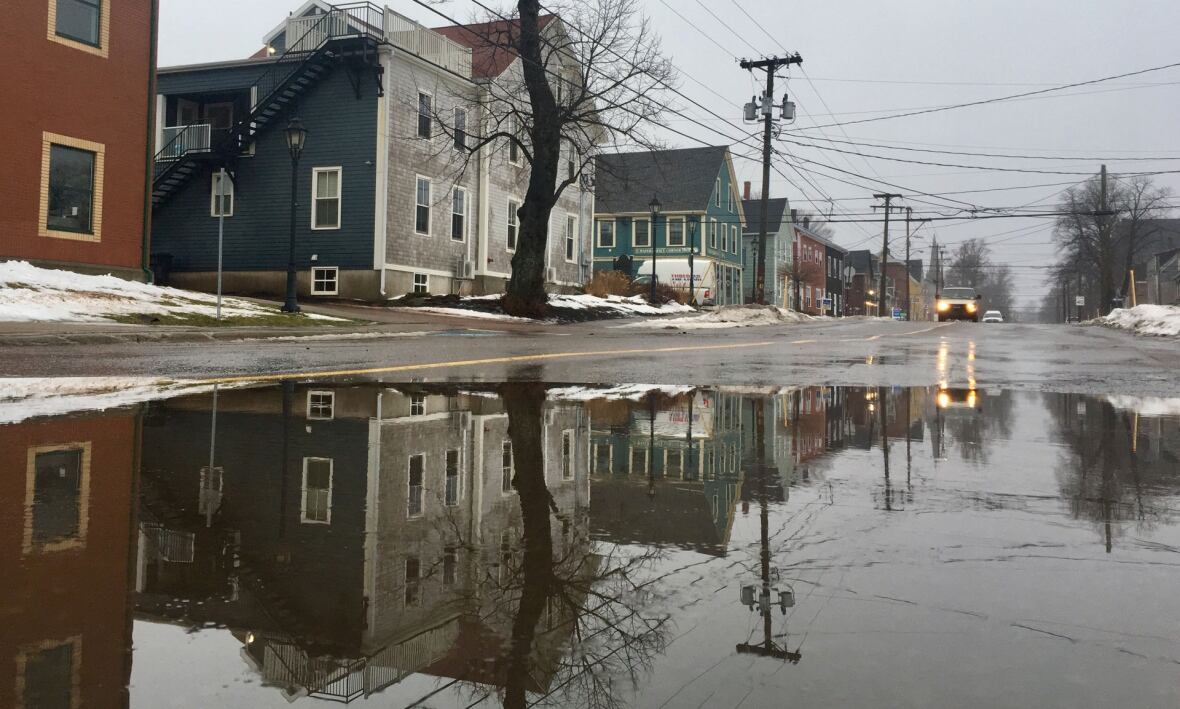Winter storm slams Eastern Canada, causing power outages, flash freeze warnings
Ontario, Quebec are under extreme cold warnings today

A winter storm that pummelled Atlantic Canada over the weekend and into Monday morning has caused flash freeze warnings and flooding, as temperatures have dropped across the region, with extreme cold warnings in other parts of the country.
The eastern storm also brought ice pellets, freezing rain and snow — forcing many flight cancellations, flooded streets, school closures and travel advisories across the Maritimes.
In New Brunswick, some offices and universities delayed opening after rain left some streets in Saint John submerged under waters filled with ice.
CBC meteorologist Tina Simpkin said there were pockets of heavy snowfall, with total accumulation of about 35 centimetres across the province.
Environment Canada was forecasting flurries and ice pellets or freezing rain across New Brunswick this morning, changing to snow in the afternoon with winds gusting to 40 km/h, and wind chill temperatures as low as –50 C.
Thousands of NB Power customers were also left in the dark early Monday. At its peak, more than 3,000 customers were without electricity.
Marc Belliveau, a spokesperson for NB Power, said freezing rain is causing trees and branches to make contact with power lines.
- New Brunswick grapples with heavy snowfall and freezing conditions
- Impact of Quebec storm continues to be felt as roads, schools close
- Toronto digs in for another day of bitter cold
Although the storm is moving eastward, Simpkin said, it producing rain over the eastern half of the Maritimes.
"Cold air is moving in behind the system and temperatures will drop below freezing this afternoon [Monday]," she said.
"A lot of cleanup I'm sure going on within the next 24 [to] 48 hours."
The SJPF is advising citizens to stay off the roads! - La force policière de Saint John demande aux gens rester à la maison et d'éviter de prendre la route.
—@saintjohnpoliceSimpkin said though other areas are not included in the Environment Canada flash freeze warnings, all of mainland Nova Scotia will see a rapid drop in temperatures below zero.
Freezing temperatures over the last few weeks have kept the ground frozen, even as temperatures climbed into the plus-double digits on Sunday, resulting in flooding in some areas.

The Halifax area received about five centimetres of snow on Sunday before the rain started, totalling more than 50 millimetres.
All that rain onto frozen ground caused localized flooding in some areas, forcing the City of Halifax to close one of the off-ramps from the MacKay Bridge.
Streets, sidewalks covered in water

On Monday, temperatures are expected to drop once again before many surfaces have a chance to dry.
Temperatures were already creeping below zero in southwestern Nova Scotia before 7 a.m. AT on Monday.
Temperatures fluctuated wildly over Eastern Canada on Sunday, from as low as –42 C in Fontages, Que., to as high as 12 C in Greenwood, N.S., according to Environment Canada.
- Figure skaters stranded as winter storm pummels Saint John
- Stormbound N.S. travellers get warm welcome in Edmundston
- Flash freeze warning closes schools
On Prince Edward Island, the storm brought 11 centimetres of snow and 13 millimetres of rain to Charlottetown Airport on Sunday, and it's the rain that followed the snow that has become an issue.

Temperatures climbed to 8 C overnight, and streets, roads and sidewalks have been covered in standing water.
The temperature is forecast to dive to –6 C by mid-afternoon and –13 C overnight, prompting a flash freeze warning from Environment Canada.

"It's slippery conditions. With the rain that we had yesterday, it's hard to treat the roadways," said Simpkin.
Newfoundland faced wind and rainfall warnings Monday, with 20 mm of precipitation forecast for the south coast, along with 50 km/h winds gusting to 80 and even 100 km/h in some areas.
Extreme cold warnings for Ontario, Quebec

In other parts of the country, Ontario and most of Quebec are under extreme cold warnings.
Environment Canada said wind chill values of –30 C to –38 C will persist throughout the morning in some parts of Ontario.
Ottawa-Gatineau remains caught in January's brutally cold grip, with Monday's forecast calling for a high of only –17 C and winds that would make conditions feel between 10 and 20 degrees colder.
Monday night's low is expected to dip to around –27 C, and that means it could only take minutes for frostbite to set in.
The overnight wind chill is expected to bottom out at –36 C.
In Toronto, the cold snap isn't over yet, either.
Monday will bring sunny skies and a high of –12 C, but with the wind chill, that would feel more like –33 C in the morning and –20 C in the afternoon.
In the early morning, the cold has prompted school bus cancellations around the Greater Toronto Area, with boards concerned about students waiting outside for their buses.
Environment Canada also warns about the risk of frostbite, saying exposed skin can freeze within just a few minutes.
Winter festival cancelled
The Montreal area was pelted with 25 centimetres of snow over the weekend, and low temperatures persist Monday.
Environment Canada has called for periods of light snowfall during the day until late afternoon, with a low of –20 C.
With the wind chill, however, the weather agency warned it could feel as cold as –33 C with a risk of frostbite.
The city even cancelled a festival dedicated to snow on Sunday.
The city said it was suspending the Fête des neiges at Parc Jean-Drapeau due to the snowy, windy and cold weather as well as the dangerous conditions on Quebec's roads.
With files from Kevin Yarr, CBC Toronto, CBC Ottawa, CBC Montreal, CBC Nova Scotia, Canadian Press


